

The Falklands War’s 30-Year Dénouement by Marcelo G. Kohen. Exit from comment view mode.
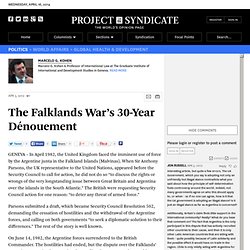
Argentine baby theft trial nears end - Features. Buenos Aires, Argentina - The trial for the theft of babies of political prisoners during Argentina's 1976-1983 dictatorship is nearing its end after more than three decades of work by the Grandmothers of the Plaza de Mayo, who have so far tracked down 105 of an estimated 500 missing children. Closing arguments will be heard this week in the trial of nine members of the military and a doctor for the kidnapping and theft of some 30 children. The sentence is expected to be handed down in late May, Alan Iud, a lawyer for the Grandmothers of the Plaza de Mayo, said. Since the years of the dictatorship, the Grandmothers of the Plaza de Mayo have been trying to find out what happened - not only to their sons and daughters, who were "disappeared" by the regime - but also to their missing grandchildren. The stolen babies were either born to political prisoners in clandestine detention centres or kidnapped along with their parents, who were later killed or "disappeared".
True identities revealed. "The Last Argentine Picture Show" by Andres Velasco. Exit from comment view mode.
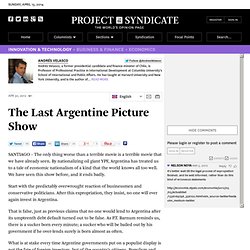
Click to hide this space SANTIAGO – The only thing worse than a terrible movie is a terrible movie that we have already seen. By nationalizing oil giant YPF, Argentina has treated us to a tale of economic nationalism of a kind that the world knows all too well. We have seen this show before, and it ends badly. Start with the predictably overwrought reaction of businessmen and conservative politicians. That is false, just as previous claims that no one would lend to Argentina after its umpteenth debt default turned out to be false.
"Argentina the Outcast" by Luiz F Lampreia. Exit from comment view mode.
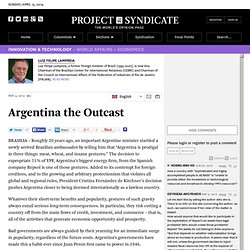
Click to hide this space BRASILIA – Roughly 20 years ago, an important Argentine minister startled a newly arrived Brazilian ambassador by telling him that “Argentina is prodigal in three things: meat, wheat, and insane gestures.” The decision to expropriate 51% of YPF, Argentina’s biggest energy firm, from the Spanish company Repsol is one of those gestures.
Added to its contempt for foreign creditors, and to the growing and arbitrary protectionism that violates all global and regional rules, President Cristina Fernández de Kirchner’s decision pushes Argentina closer to being deemed internationally as a lawless country. Whatever their short-term benefits and popularity, gestures of such gravity always entail serious long-term consequences. Bad governments are always guided by their yearning for an immediate surge in popularity, regardless of the future costs. But that depends on whether nationalization brings about an increase in production. Argentina loses a third of its dollar deposits. Argentina won't be joining the global petro-surge any time soon. Argentine President Cristina Fernandez de Kirchner, angry at a rising national oil bill and emboldened by her own populist fervor, has relieved Spain's Repsol of most of its shares of YPF, the country's biggest oil company.

Repsol, which since 1999 has owned 57.4 percent of YPF, will now have about 6 percent. Spain has lashed out, rating agencies are reconsidering political risk in Argentina, and analysts generally seemed to regard it as a bad move. Repsol has not said so since yesterday, but it naturally would be unhappy with Fernandez (pictured above). "Argentina’s Energy Dilemma" by Alieto Guadagni. Exit from comment view mode.
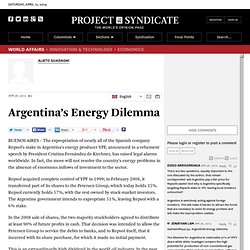
Click to hide this space. "Argentina before the Law" by Ana Palacio. Exit from comment view mode.
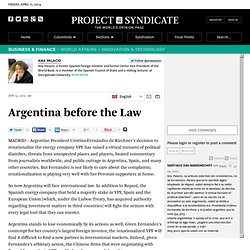
Click to hide this space MADRID – Argentine President Cristina Fernández de Kirchner’s decision to renationalize the energy company YPF has raised a virtual tsunami of political diatribes, threats from unexpected places and players, heated commentary from journalists worldwide, and public outrage in Argentina, Spain, and many other countries. But Fernández is not likely to care about the complaints; renationalization is playing very well with her Peronist supporters at home. So now Argentina will face international law.
In addition to Repsol, the Spanish energy company that held a majority stake in YPF, Spain and the European Union (which, under the Lisbon Treaty, has acquired authority regarding investment matters in third countries) will fight the seizure with every legal tool that they can muster. Argentina stands to lose economically by its actions as well. In the end, a solution must be found that is acceptable to all. Argentina: The New Narco State - By Haley Cohen. BUENOS AIRES — Last September, Argentine Judge Carlos Olivera Pastor emerged from his courthouse in the northwestern province of Jujuy to find a box next to his parked car.

Numbered as if it held judicial files, Pastor removed the box's top and found instead a decapitated head, the eyes glassy and open. In October, two men savagely assaulted a penal secretary from the same district, warning that the next time they would murder him. According to officials at SEDRONAR, a government agency that fights addiction and drug trafficking, most of the drugs that enter Argentina pass through the sparsely populated northwest of the country, and the judges, who frequently handle drug-related cases, avowed narco-traffickers were responsible for the incidents.
Busts over the past two years suggest that Spain is an especially popular entry point for drugs dispatched from Argentina. "Pretty much everyone I know does it," says a 30 year-old Argentine waitress who buys about a gram of cocaine a week.